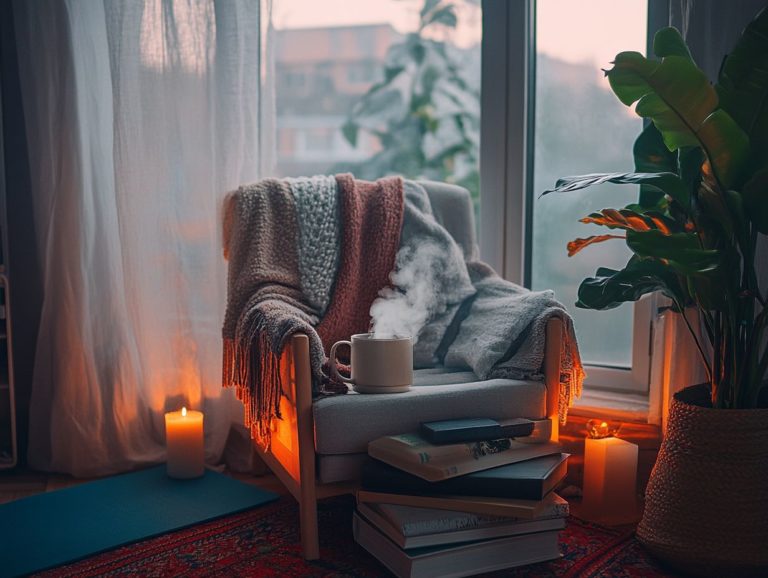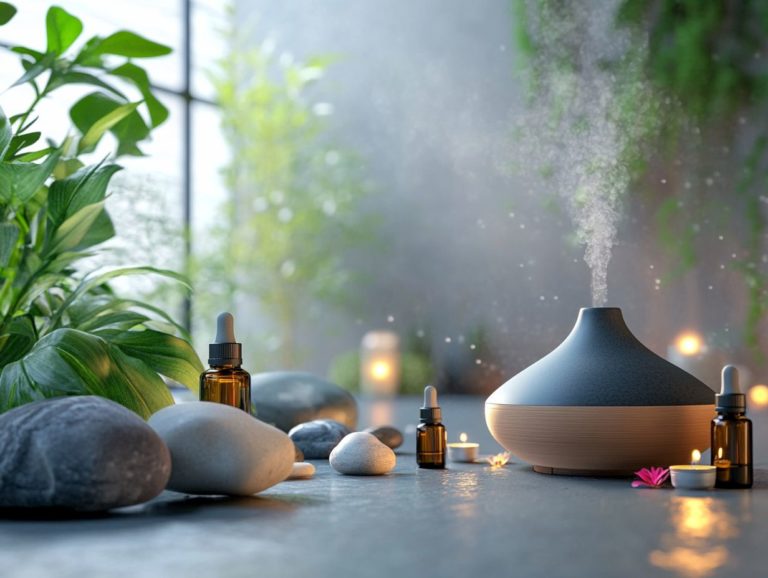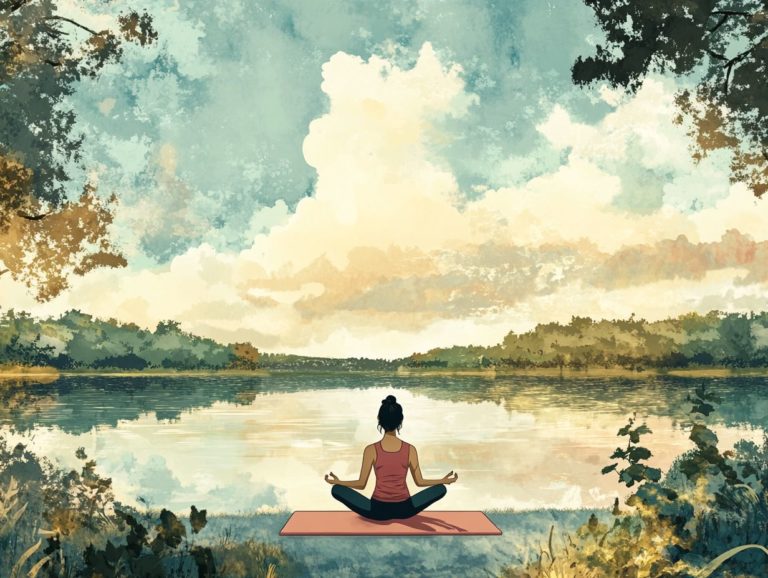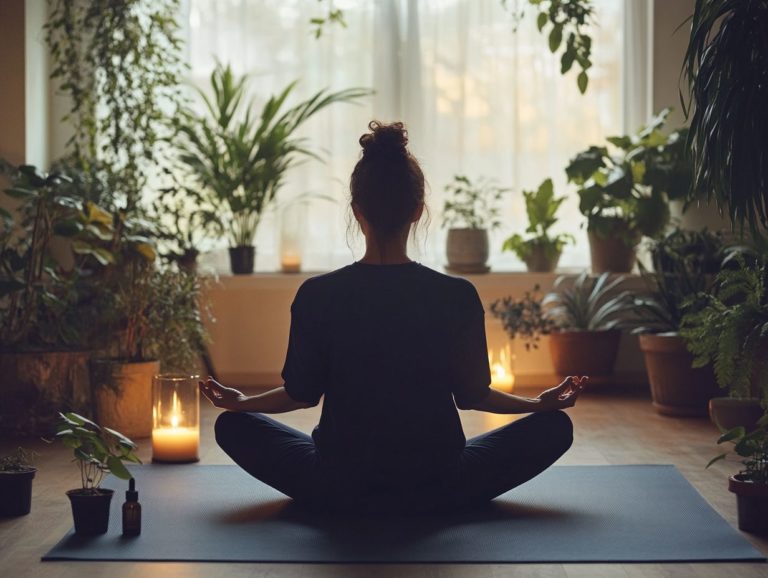7 Ways to Experience Deep Relaxation
In today s fast-paced world, discovering moments of tranquility can seem like an indulgence. However, deep relaxation is vital for your mental and physical well-being.
This article delves into seven effective techniques, ranging from deep breathing and progressive muscle relaxation to the simple pleasures of nature and soothing music.
It highlights how these practices can enhance your mind and body, addresses common obstacles to relaxation, and offers tips for seamlessly integrating these techniques into your daily routine.
Dive into deep relaxation and discover its life-changing benefits, leading to a more profound peaceful state.
Contents
Key Takeaways:
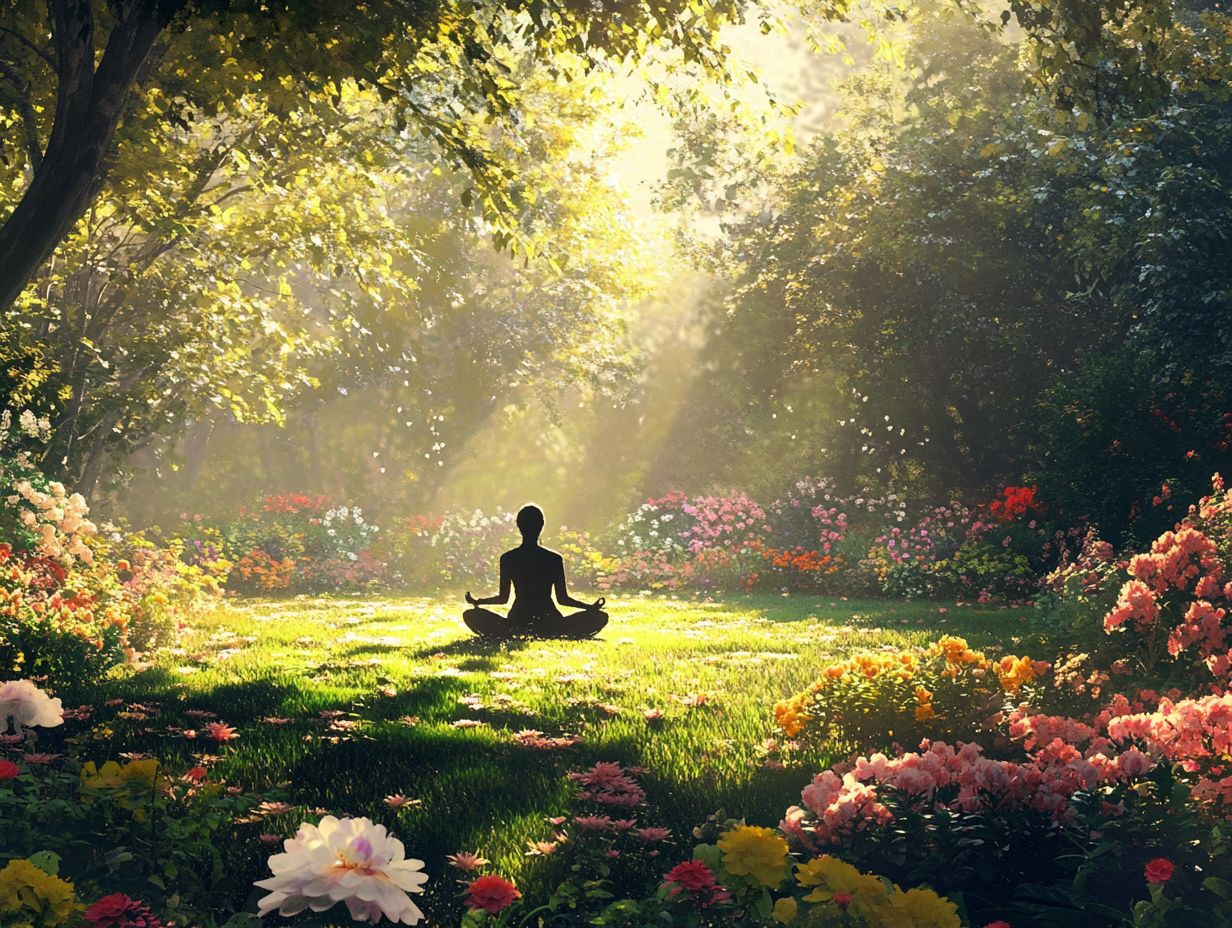
- Experience deep relaxation through breathing exercises, progressive muscle relaxation, and mindfulness meditation.
- Discover the numerous benefits of relaxation, like reduced stress and improved well-being.
- Make relaxation part of your daily routine to overcome barriers and achieve lasting stress relief.
1. Practice Deep Breathing Techniques
Practicing breathing exercises is vital for reaching a state of tranquility. This approach fosters relaxation and allows you to reconnect with your body, enhancing self-awareness and emotional processing.
It also alleviates stress and anxiety, leading to anxiety relief. Among these methods, deep belly breathing is particularly noteworthy.
By engaging your diaphragm to draw air deeply into your lungs, you boost oxygen flow and anchor your attention in the present moment. This technique helps quiet your mind, making it easier to release intrusive thoughts.
The 4-7-8 technique involves inhaling for four seconds, holding for seven, and exhaling for eight. This practice calms the nervous system and promotes equilibrium.
Both techniques promote mindfulness, leading to sharper mental clarity and a deeper sense of tranquility, ultimately enhancing your overall mental health.
2. Try Progressive Muscle Relaxation
Progressive muscle relaxation is an incredibly effective technique that helps you relax by tensing and then relaxing your muscles, one group at a time.
By honing in on the physical sensations tied to tension and relaxation, you can cultivate a heightened awareness of your body s response to stress.
This method invites you to begin at your feet, gradually working your way up to your head, tightening each muscle group for a few seconds before releasing.
Through this practice, you alleviate physical tension and enhance your emotional well-being. It becomes a vital component of any effective stress management routine.
Ultimately, with consistent application, progressive muscle relaxation fosters a profound sense of calm, contributing to a more balanced state of mind.
3. Engage in Mindfulness Meditation
Engaging in mindfulness meditation allows you to cultivate a profound connection to yourself. This enhances self-awareness and fosters a sense of inner peace.
By incorporating techniques such as the body scan, where you pay close attention to physical sensations from head to toe, or focused breathing that encourages deep, mindful inhalations and exhalations, you unlock significant mental health benefits.
Mindful listening also plays a crucial role in this journey. It enables you to genuinely absorb the nuances of sounds and conversations without judgment.
Together, these practices contribute to stress relief, helping you process emotions more effectively and achieve clearer thinking, ultimately promoting a healthier mental state.
4. Listen to Soothing Music
Listening to soothing music can transform your space into a tranquil haven. It significantly enhances your relaxation response, reduces stress levels, and promotes emotional wellness and mental clarity.
Genres like classical, with its gentle symphonies, and ambient music, known for its atmospheric textures, work wonders in calming the mind. Imagine the gentle rustling of leaves or the rhythmic flow of water; these nature sounds whisk you away to serene landscapes, creating the perfect backdrop for unwinding.
Music greatly impacts how we feel, helping manage stress. Engaging with these peaceful melodies can trigger the release of chemicals in your brain that help boost your mood and alleviate anxiety. As a result, many individuals find that incorporating such styles into their daily routines becomes a valuable tool for understanding their feelings and enhancing mental health.
5. Get a Massage
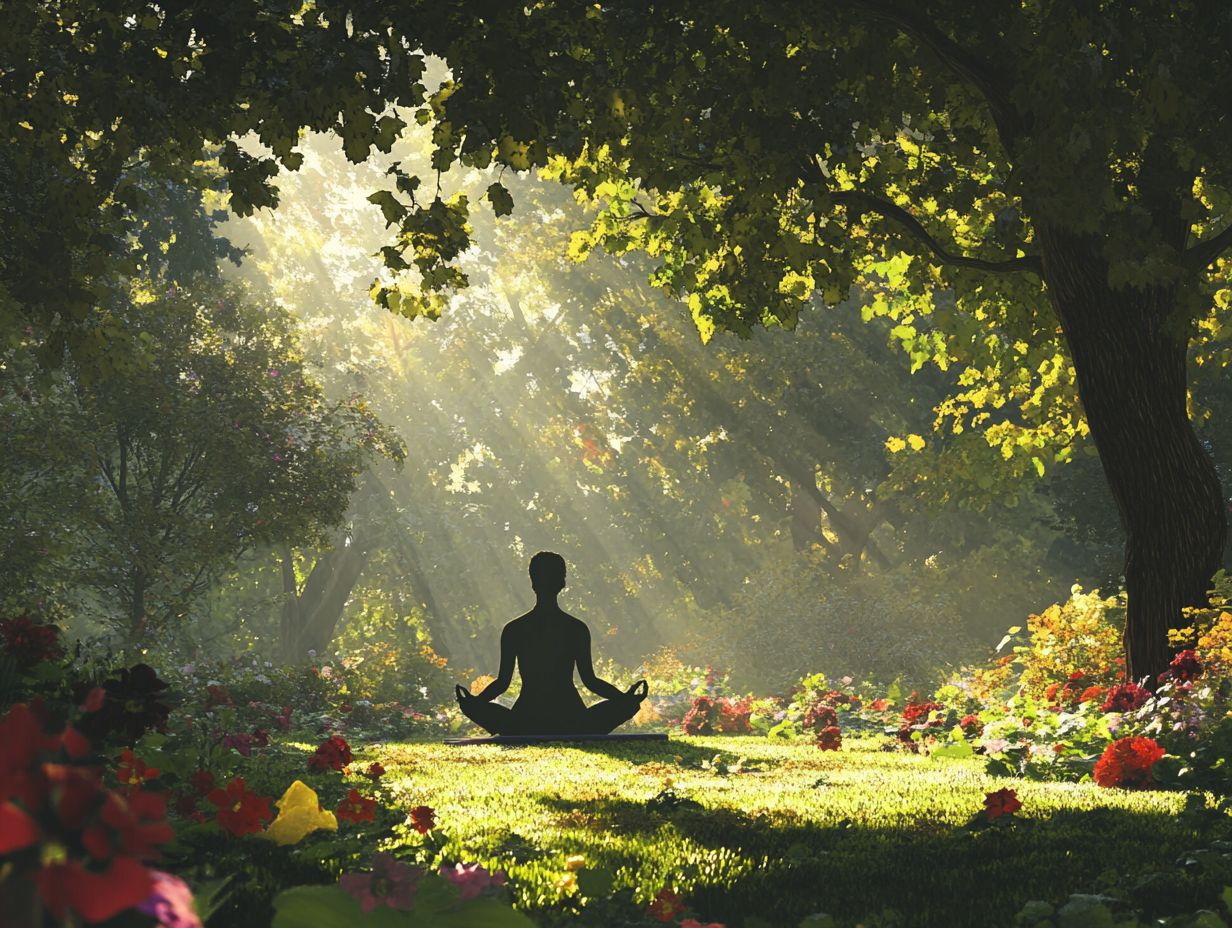
Receiving a massage is an exceptional relaxation technique that alleviates physical tension while fostering an emotional connection. It ultimately enhances your overall well-being and tranquility.
Among the myriad of massage options available, Swedish massage truly stands out with its gentle approach. This technique employs long strokes and kneading that promote relaxation, improve circulation, and effectively release muscle knots.
On the other hand, deep tissue massage delves into the deeper layers of muscle and connective tissue, making it the perfect choice for those dealing with chronic pain or persistent tension. Both techniques offer more than just physical relief; they significantly reduce anxiety and stress levels, leading to improved mental clarity and emotional stability.
Get ready to discover how these therapies can transform your life! As you explore these therapeutic options, you’ll likely feel a renewed sense of balance and peace in your daily life.
6. Spend Time in Nature
Spending time in nature is a powerful grounding technique that promotes tranquility, enhances self-compassion, and helps reduce stress. It allows you to reconnect with your intuitive desires and cultivate focus.
Engaging in activities like hiking, gardening, or simply sitting in a park offers profound mental health benefits. These natural settings provide a serene backdrop that encourages relaxation and mindfulness, giving you a much-needed break from everyday distractions.
As you immerse yourself in the rhythms of the outdoors, you’ll quickly notice your focus sharpening and a renewed sense of clarity emerging. Whether it s the gentle rustle of leaves in the breeze or the vibrant colors of blooming flowers, each element contributes to a soothing environment that nurtures your emotional well-being and fosters a deeper connection to yourself and the world around you.
7. Take a Warm Bath
A warm bath is a great way to relax, promoting muscle relaxation, relieving stress, and enhancing your emotional wellness through its soothing warmth and tranquility.
By adding Epsom salts to your bath, you unlock even more benefits, such as improved circulation and reduced inflammation, providing extra relief for sore muscles. Including essential oils in your bath elevates the experience further; calming scents like lavender or chamomile create an aromatic haven that eases your mind and uplifts your mood.
Playing soft, calming music transforms your bath into a holistic sanctuary, allowing your thoughts to drift away from daily stressors. This simple yet enriching practice nurtures your overall mental health, offering you a precious opportunity to unwind and rejuvenate both body and spirit.
How Does Deep Relaxation Benefit the Mind and Body?
Deep relaxation provides a wealth of benefits for both your mind and body. These include enhanced well-being, improved mental clarity, stress relief, and the promotion of emotional processing. All these factors contribute to a more peaceful environment.
Techniques such as mindfulness meditation and progressive muscle relaxation can be powerful allies in fostering a state of calmness and presence. Research supports this, indicating that mindfulness meditation reduces anxiety and depression while elevating feelings of happiness and resilience.
For instance, a study published in the Journal of Happiness Studies revealed that participants who engaged in mindfulness practices experienced a notable decrease in negative thoughts and an improvement in emotional regulation.
Progressive muscle relaxation also works wonders in alleviating physical tension and lowering cortisol levels. This ultimately promotes relaxation and well-being. Experts advocate for regularly incorporating these techniques into your daily routine, as they can lead to enduring improvements in mental clarity and emotional stability.
What Are the Common Barriers to Achieving Deep Relaxation?
Common barriers to achieving deep relaxation include persistent stress and unmanaged anxiety. A lack of emotional connection can also inhibit your ability to engage in relaxation techniques and stress management.
Distractions in your environment, such as noise or interruptions, can significantly disrupt the process. These distractions make it challenging to focus on your inner peace. Negative thought patterns might intrude, leading to a cycle of self-doubt that amplifies feelings of unease.
Physical discomfort from tension or poor posture can further distract you from relaxing. To effectively navigate these hurdles, practice self-compassion and engage in emotional processing. Acknowledge your feelings without judgment.
Techniques such as mindful breathing, gentle stretches, and creating a calming environment can help cultivate a more conducive atmosphere for relaxation.
How Can One Incorporate Deep Relaxation into Their Daily Routine?

You can easily incorporate deep relaxation into your daily routine through mindfulness practices, scheduled relaxation exercises, and intentional self-care strategies that elevate your overall well-being.
By committing to short intervals of breathing exercises, perhaps during a lunch break or while waiting in traffic, you can swiftly alleviate stress. Imagine utilizing guided imagery to vividly visualize serene landscapes, even if it’s just for a moment to escape your busy surroundings.
Engaging in mindful listening, where you pay close attention to ambient sounds like rustling leaves or soft music, can significantly ground your mind. These simple yet powerful techniques not only provide immediate relief but also contribute to long-term mental health benefits. They foster resilience against anxiety and enhance your overall emotional health.
What Are the Different Types of Relaxation Techniques?
Various relaxation techniques, such as breathing exercises, visualization, and self-hypnosis, are crucial for fostering deep relaxation and enhancing mental clarity. These practices become essential tools for anyone aiming to manage daily stressors and cultivate emotional wellness.
You can effortlessly weave breathing exercises into your busy schedule, allowing you to find quick moments of calm amidst the chaos of your workday. Visualization techniques invite you to conjure serene landscapes or peaceful scenarios, whisking your mind away from stress, even if just for a few minutes.
Self-hypnosis is a method where you focus your mind to bring about positive changes. It can assist in tackling specific anxieties or habits, giving you the power to reinforce positive behaviors and mental patterns.
By incorporating these practices into your morning routine or taking breaks throughout the day, you can create an environment that nourishes healing and tranquility.
In summary, deep relaxation offers numerous benefits for your mind and body. By recognizing barriers, incorporating techniques into your daily life, and understanding different relaxation methods, you can foster a greater sense of well-being and emotional stability.
Can Deep Relaxation Help with Specific Health Conditions?
Deep relaxation techniques can be very helpful in managing specific health conditions. They offer relief from anxiety and enhance your emotional wellness, especially if you’re dealing with chronic pain or stress-related disorders.
Research indicates that practices such as mindfulness meditation, progressive muscle relaxation, and deep breathing exercises can effectively lower stress hormone levels and improve your overall health. For instance, a study published in the Journal of Clinical Psychology revealed that participants who regularly engaged in deep relaxation experienced noticeable reductions in both anxiety and pain severity.
A physical therapist shared insights about the transformative effects of these techniques on her patients. She noted how one individual with fibromyalgia reported decreased pain and a surge in energy after integrating deep relaxation into her routine.
Such expert opinions and real-life testimonials highlight the profound impact these methods can have on your mental and physical well-being.
What Are the Long-Term Effects of Regular Deep Relaxation?
Regular deep relaxation can yield remarkable long-term benefits for your mental health. These include enhanced stress management, improved emotional processing, and a greater sense of inner peace.
These practices nurture a calm mindset and bring about changes in the body that help handle everyday stressors. By consistently incorporating relaxation techniques into your routine, you may find yourself better equipped to tackle life s challenges. This leads to sharper thinking skills and greater emotional stability.
As you weave these calming rituals into your daily life, you can experience significant improvements in your overall well-being. This allows for quicker recovery from adversity. Such transformations can pave the way for a lifestyle that prioritizes not just mental serenity but also physical vitality, setting the stage for a more harmonious existence.
Frequently Asked Questions
What are the 7 ways to experience deep relaxation?

The 7 ways to experience deep relaxation are: deep breathing, progressive muscle relaxation, visualization, mindfulness meditation, body scan meditation, yoga, and massage.
How does deep breathing help with relaxation?
Deep breathing helps relax the mind and body by increasing oxygen levels, slowing down the breathing rate, and reducing muscle tension.
What is progressive muscle relaxation?
Progressive muscle relaxation is a method of relaxing by tensing and relaxing different muscle groups in the body to release tension and promote relaxation.
How does visualization promote deep relaxation?
Visualization involves creating a mental image of a peaceful and calming place. This practice helps the mind to relax and reduces stress and anxiety.
Can mindfulness meditation help with relaxation?
Yes, mindfulness meditation involves focusing on the present moment and accepting thoughts and feelings without judgment. This can help reduce stress and promote relaxation.
What is body scan meditation?
Body scan meditation involves slowly scanning through each body part and bringing awareness to any tension or discomfort. You then consciously relax those areas to promote relaxation.
How does yoga promote deep relaxation?
Yoga combines physical movements, controlled breathing, and mindfulness to release tension and promote relaxation in both the mind and body.
Start implementing these techniques today for a happier, healthier you!

